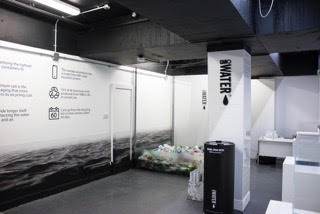
 CanO Water, the alternative to single use plastic bottles, is launching a new campaign to encourage Londoners to be more environmentally friendly. The #canthebottle education hub, in Old Street station, will raise awareness of the damaging effects of using plastic. The campaign encourages Londoners to visit the hub, and drop off their plastic bottles, receiving in return, a more sustainable can of water.
CanO Water, the alternative to single use plastic bottles, is launching a new campaign to encourage Londoners to be more environmentally friendly. The #canthebottle education hub, in Old Street station, will raise awareness of the damaging effects of using plastic. The campaign encourages Londoners to visit the hub, and drop off their plastic bottles, receiving in return, a more sustainable can of water.
The Stats
In the UK, we consume 18 billion plastic bottles a year and only a quarter of these are recycled.
38 million plastic bottles end up in landfill every day and drinking one bottle of water a day has the same impact on our environment as driving a car for a kilometre.
Plastic water bottles also contribute to several health issues due to BPA which is the industrial chemical that is used to make plastic. The ripple effect of BPA on our health effect your sleep, mood and has even been proven to promote risk of breast cancer cell growth.
A report published by the NHS reveals that it also increases risk of lower sperm count or creates an erectile dysfunction. By making smarter choices with such a simple swap, CanO Water is encouraging people to become part of a much bigger movement and come down to #canthebottle.
The temporary space features powerful imagery, showing the current state of our beaches and oceans, contrasting with projected imagery from 2050, highlighting the devastating consequences of continuing to use plastic bottles. There will be educational talks hosted by a range of experts, as well as drop in opportunities to speak to the founders about their mission.
The educational hub runs until the 20th. Come down to take part in the #canthebottle campaign and learn how you can make a difference.
CanO Water launched in 2015 hoping to inspire other millennials to work together in hope to ban ‘eco-unfriendly’ products. Determined to offer everyone an alternative to single – use plastic bottles, CanO Water created a simplistic and stylish aluminium can. Aluminium has the highest recycling rate of any drink on the market, recycle your can and it could be back on the shelf in as little as 6 weeks. Cans provide a long shelf life by protecting products inside from light, oxygen and other factors that can affect taste, and product safety. The ‘can’ also has a smart releasable lid making it the perfect on – the – go product.
CanO Water has recently caught the eye of several high profile environmentalists such as David Gandy, Ellie Goulding and Dougie Pointer by offering a simple alternative that can really make a difference. Most notably, the brand was flown by Vanity Fair to feature at their prestigious Vanity Fair’s 2017 Oscar party. The state of California has banned plastic bottles, and the guest list for the event included well known sustainability personalities, including Leonardo DiCaprio and Meryl Streep.
